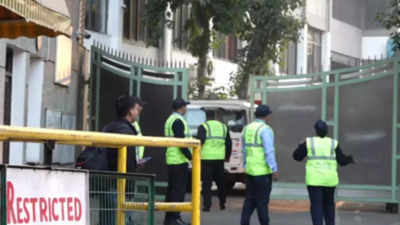School bomb threats in 2024: The exam season is no stranger to desperate measures, but 2024 saw an unprecedented turn when students weaponised hoax bomb threats to dodge tests. In a year already marked by numerous bomb scare incidents across India, the revelation that some of these threats were orchestrated by students to postpone exams added a new, unsettling layer to the chaos.
The “exam dodge” emails
In mid-December, Delhi Police unraveled the peculiar case of two students from Rohini schools who sent bomb threat emails to their own institutions. Their motive? They weren’t prepared for their exams and saw no better way out than to instill panic.
The Special Cell of Delhi Police, through a meticulous investigation tracing IP addresses, identified the culprits. The students confessed, citing ‘academic unpreparedness’ as their reason. While they were let off with counseling and warnings to their parents, the incident highlighted a worrying trend of young individuals resorting to extreme measures.
This wasn’t an isolated event. A student from Paschim Vihar admitted to a similar act after the police traced an email back to his home. These incidents, seemingly isolated, mirrored a larger pattern of school bomb threats that gripped the country throughout the year.
From panic to patterns: School bomb-threat wave of 2024
The story of bomb threats in Indian schools began in earnest in late April 2024. From there, the year unfolded as a tapestry of alarming emails and calls, disrupting educational institutions and sowing fear among students and parents alike. Here’s how the chaos unfolded:
May 2024: Bomb threats sweep the nation
On May 1, over 200 schools in Delhi-NCR received identical bomb threat emails, triggering mass evacuations and parental panic. Institutions like Sanskriti School in Chanakyapuri and Delhi Public School in Dwarka and Noida were among those targeted. The threats, eventually declared hoaxes, were traced to an email originating from a Russian IP address.
The ripple effects were felt across the country. On May 6, 41 schools in Ahmedabad received similar threats. By May 14, coinciding with the anniversary of the 2008 Jaipur bombings, over 55 schools in Jaipur became targets of bomb threat emails. Hospitals, the Tihar Jail, and other critical establishments also received threats, indicating a pattern of coordinated, albeit baseless, intimidation.
Universities and colleges join the list
May didn’t spare colleges and universities either. On May 23, over a dozen Delhi University colleges, including Hansraj College and Sri Venkateswara College, received threatening emails. State universities like Delhi Pharmaceutical Sciences and Research University weren’t left out. The unsettling frequency of these threats led authorities to suspect organized attempts to disrupt academic activities.
A quiet lull, then another storm
While schools experienced a relative calm between June and September, other sectors bore the brunt of bomb scare hoaxes. Government offices, airports, and hotels reported a surge in threats, particularly in October, when the aviation sector recorded over 500 fake alerts in two weeks.
The year’s tally of hoaxes hit 999 by mid-November, a staggering tenfold increase from the previous year, according to a BBC report. Among the perpetrators was a 17-year-old dropout arrested for issuing bomb threats to multiple flights via social media.
December 2024: A chaotic finale to the year
December brought the crisis back to schools. On December 9, over 40 Delhi schools received emails demanding a $30,000 ransom and threatening to injure students with hidden explosives. Evacuations ensued, mirroring earlier panics. On the same day, six hotels in Gurugram reported similar threats, underlining the pervasive nature of these hoaxes.
The lasting impact of bomb-scares and what remains unanswered
These incidents have left lasting scars on the psyche of students, educators, and parents. Former Delhi Chief Minister Arvind Kejriwal’s concern about the psychological toll on children found resonance amid these events. The sheer volume and range of targets, schools, colleges, hospitals, airports, and hotels underscore the need for a robust strategy to tackle such threats.
While some cases, like the students’ exam-avoidance emails, may elicit a wry chuckle, the overarching narrative is one of disruption and fear. As authorities work to prevent future incidents, the question remains: How do we address the root causes, whether academic pressure or the allure of digital mischief to ensure the safety and well-being of all involved?
(With agency inputs)


